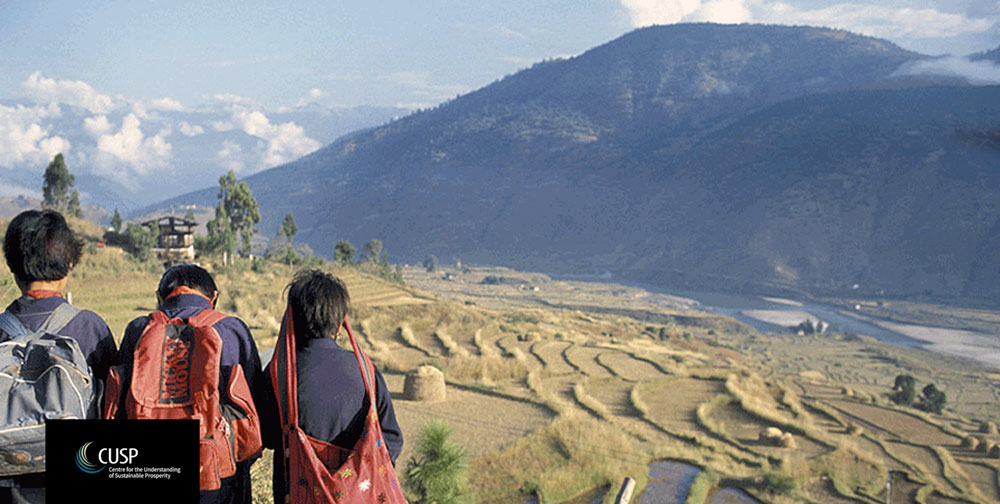Happiness and enterprise – a view from Bhutan
In this blog, CUSP deputy director Prof Fergus Lyon is looking at the concept of Gross National Happiness as explored by The Kingdom of Bhutan, discussing its practical implications for socio-economic development and alternative enterprises.
Blog by FERGUS LYON

Bhutan has offered the world an alternative development path with a focus on wellbeing, culture and the environment. They have coined the term Gross National Happiness as a policy direction that gives an alternative to GDP. But this raises the question of what kind of economy might you have that focuses on GNH, and what kind of enterprise might be operating in this economy. These are questions being raised in the theme of Alternative Enterprises in CUSP, and the case of Bhutan is discussed in a new short paper by Fergus Lyon and Tim Jackson on Alternative enterprise and GNH, an agenda for sustainable prosperity?
Sustainable prosperity, defined as the capabilities that people have to flourish within the resource constraints of a finite planet, shares much in common with the aspirations of Gross National Happiness. But as I have shown elsewhere, there is a need to show what this means in practice and the impact on the everyday lives of all. Gross National Happiness is not a panacea, and Bhutan faces a number of challenges in ensuring that this approach to development reaches out to all the country and helps both young and old. However, it does raise interesting questions and the space for alternative forms of economy beyond large scale foreign direct investment.
Enterprise development and the creation of jobs is a crucial element of socio-economic development in Bhutan. All parts of the economy have a role to play in increasing prosperity and this can come from public and private sector, small and large organisations, urban and rural areas. One particularly interesting avenue is the social economy which aims to combine social, environmental or cultural objectives with commercial success.
For example in Bhutan, Lama Sonam Gyatsho, a monk from Beyul Langdrak Monastery set up a an enterprise making incense sticks in order to fund a monastery and provide local employment in an area where there was considerable poverty. There are also examples of cooperatives supporting farmers’ enterprises in the north and south of the country such as the Happy Green Cooperative, growing potatoes for local crisp manufacture. In a similar vein, the Samdrup Jongkhar Inititiative draws on GNH aspirations to support rural livelihoods and the entrepreneurial spirit.
The social economy is also found in the service sector with Pushpa Chettri setting up the Bhutan Media and Communications Institute (BMCI) which has the social objective of providing training in media and journalism with a focus on local development. It is able to generate income from having contracts from government and NGOs to run courses and also from the fees that trainees are willing to pay. Another social enterprise has been set up by Maiyesh Kumar Tamang preserving traditional skills and innovating new ceramic products. In addition a number of larger tourist related businesses have strong policies related to GNH that go beyond the usual aspects of Corporate Social Responsibility in order to develop eco-tourism or to reduce pollution.
Growing these areas of the social economy requires three related aspects: firstly a culture of social entrepreneurship that can start in schools and show what is possible; secondly, help to enterprises, especially where they are trying to combine social, environmental and commercial objectives; and finally suitable finance that allows these enterprises to be established and grow. This requires grants and long horizon lending.
These examples of enterprises show that there can be alternative businesses and a new economics, anchored in principles of wellbeing and social justice, ecological constraints, long term investment and stability. While there is much attention to GNH around the world, these entrepreneurs show how it can be put into practice. The challenge is to open the chance for entrepreneurship amongst those excluded from opportunities.



